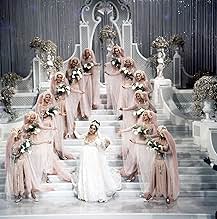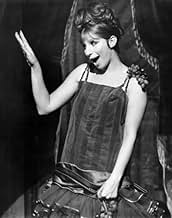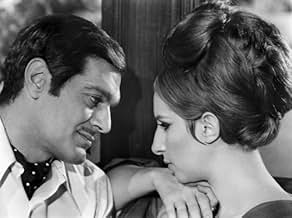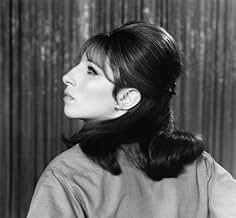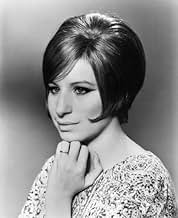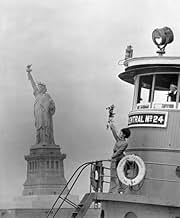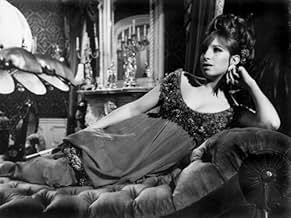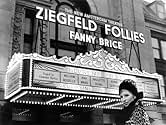AVALIAÇÃO DA IMDb
7,4/10
27 mil
SUA AVALIAÇÃO
Relata a história de Fanny Brice, uma famosa comediante do início do século XX. Vemos sua ascensão à fama, sua carreira subsequente e sua vida pessoal, particularmente seu relacionamento com... Ler tudoRelata a história de Fanny Brice, uma famosa comediante do início do século XX. Vemos sua ascensão à fama, sua carreira subsequente e sua vida pessoal, particularmente seu relacionamento com Nick Arnstein.Relata a história de Fanny Brice, uma famosa comediante do início do século XX. Vemos sua ascensão à fama, sua carreira subsequente e sua vida pessoal, particularmente seu relacionamento com Nick Arnstein.
- Ganhou 1 Oscar
- 8 vitórias e 16 indicações no total
Karen Stride
- Ziegfeld Girl
- (as Karen Lee)
Avaliações em destaque
Barbra Streisand made one the biggest debuts in the history of films playing Fanny Brice in Funny Girl. She also won an Oscar as best actress of 1967 for her efforts. Although this musical bogs down a bit in the second half, Streisand keeps the viewer glued to the screen with her brilliant portrayal of this great star. Terrific musical numbers come one after another, and Streisand shifts gears effortlessly between comic gems like "I'm the Greatest Star" and "The Roller Skate Rag" and signature tunes like "People" and "Don't Rain on My Parade." Her closing rendition of "My Man" is very effective (and was copied by Diana Ross in Lady Sings the Blues). Big and bright and splashy, Funny Girl is one of the last great, old-style musicals produced in Hollywood. Omar Sharif, Walter Pidgeon, Anne Francis, Kay Medford, Mae Questel, Frank Faylen, and Lee Allen co-star. Meford won a supporting Oscar nomination as the mother. Pidgeon should have been nominated for his role as Flo Ziegfeld. And I think Questel is a scream as the local yenta. But the center of this film is Streisand. Every number is a gem, and she looks great. There may be better musicals, but you'd be hard pressed to name a better performance in a musical than Barbra Streisand playing Fanny Brice in Funny Girl.
Others in the cast include Gertrude Flynn and Penny Santon as the card players, Tommy Rall as the prince in the ballet sequence, Mittie Lawrence as the maid, Gerald Mohr as the gangster, Inga Neilsen and Bettina Brenna as show girls, and Elaine Joyce in the roller skating number.
Others in the cast include Gertrude Flynn and Penny Santon as the card players, Tommy Rall as the prince in the ballet sequence, Mittie Lawrence as the maid, Gerald Mohr as the gangster, Inga Neilsen and Bettina Brenna as show girls, and Elaine Joyce in the roller skating number.
Every time a film is made about a real-life figure, particularly a show business figure, people love to complain that the movie is not accurate regarding the facts of that person's life. If the truth be told, if movie biographies were strictly about the facts, no one would go to see them, because for the most part, the facts don't make for great entertainment and Fanny Brice is no exception. The 1968 musical FUNNY GIRL has been maligned for years because it is not a very accurate representation of the facts of Fanny Brice's life. If you want to learn about Fanny Brice's life, read a biography or go on the internet, but if you want to see an amazing movie musical spotlighting a legendary performer at the beginning of her amazing career, then you can't beat FUNNY GIRL, the 1968 musical based on the 1964 Broadway musical that made Barbra Streisand a star. Streisand tied with Katharine Hepburn for the Best Actress Oscar for this charismatic star turn as the young girl from Henry Street who becomes a big star of the Ziegfeld Follies and has a heartbreaking romance with a charming gambler named Nick Arnstein, played by Omar Sharif. Streisand is in practically every frame of this film and never makes you wish otherwise...one of the great performances in the history of cinema...whether she is defying Florenz Ziegfeld by refusing to appear in the finale or chasing an ocean liner to be with Nick, Streisand gives the one-woman performance of a lifetime here. Directed by Oscar-winner William Wyler, Streisand is lovingly photographed and effectively showcases the Jule Styne-Bob Merrill score, which includes classics like "People" and "Don't Rain On My Parade". Some changes have been made in the score from the stage musical but Streisand makes it all work and the finale "My Man" is just devastating. It's not an accurate biography of the vaudeville legend, but as a dazzling and entertaining movie musical, it's hard to top this one.
Tour-de-force for Barbra Streisand, reprising her Broadway triumph and taking over the screen as 1930s Ziegfeld singer/comedienne Fanny Brice. Streisand's incredible self-assurance and clowning poise was enough to win her the Best Actress Oscar AND tick off most of Hollywood (few in the business were prepared for someone like Streisand in 1968, except maybe those familiar with her TV work, but the results here show she didn't care what anyone thought of her). The sets look phony, the script is contrived, and Omar Sharif is somewhat miscast as husband Nick Arnstein (Sharif is wonderful in the early stages, but his wet, red eyes and mincing baby-talk grow incredibly weary); however most of the song numbers are fabulous, and Barbra is at her best when delivering a high-powered number. She's tough and unyielding even while doing a comedic bit, but during an emotional song she lets her guard drop a little (not enough to become truly vulnerable, just enough to let us share her pain). The film doesn't exhaust one the way some musical extravaganzas can; the camera-work is uneven and some sequences are overlit, but it has lots of spirit and dazzle. Most importantly, it's a film that remembers it is about a woman and a man, and never allows the show-biz glitter to suffocate the characters. *** from ****
I've seen this film many times,and I've always thought it was one of Barbra Streisand's best films because it allowed her to use her strengths as a comedian, singer, and dramatic actor. It's clear that her presence dominates the movie; however, there are some excellent supporting players, including Kay Medford as Fanny Brice's mother Rose and Walter Pigeon as Florenz Ziegfeld, two very fine character actors. Rose is particularly likable because, unlike her daughter Fanny, she sees things as they are and not the way they should be. This applies to her comment about Nick Arnstein, the handsome gambler that Fanny marries, despite the fact that Rose perceives him to be a "sponge."
Fanny, as shown in this film, is also very likable not only because of her humor but for her generosity and thoughtfulness. Her ambition, of course, is to conquer the stage and she does so fairly quickly after making a great mess of a roller skate number at the local dance hall. Before long, Fanny is auditioning for Ziegfeld, the famous impressario and she wins him over with her talent and charm. Nick Arnstein, a man about town, always seems to be around Fanny when she triumphs on the stage and this time is no different. He buys her a beautiful bouquet of roses with a note, "Dear Star, I told you so." Very soon, Fanny and Nick become involved in a relationship which is often on and off until Fanny literally proposes to him. What follows is a heartbreaking story of a young woman whose desire to be loved for herself alone and her passion for a happy domestic life is thwarted by fate and some wrong choices.
After a montage of the first year of their marriage together, problems start affecting the Arnstein marriage. It is true that they are wealthy people; however, their problems aren't minor. Nick begins to lose heavily at the gaming table and everything he tries ends in failure. Fanny, on the other hand, continues to be successful on the stage and Nick starts to resent her. Suddenly, all of his gentlemanly charm and good manners disappear as if by magic; he's rude to Fanny, making her upset over things that a truly married couple would find a way to resolve. Indeed, he starts ignoring her deliberately and places his interests and needs above hers. After a while, the marriage collapses not because of Fanny's career but the way in which Nick looks at their relationship (we discover this near the end of the film.) He also conceals his financial problems from her, shutting Fanny out of his life as though she didn't exist.
All of this culminates in Nick's unfortunate involvement in a shady bond scheme which sends him to prison for two years. I would say that these problems are rather huge. I don't want to give more away because I feel others should have the opportunity to see the film and judge for themselves. But I have to say that the ending of the movie, is, in my opinion, one of the most heartfelt, dignified, and classiest moments ever put on film. And Barbra Streisand makes the most of it, touching us not only with her excellent performance of the song "My Man" but also by the way her Fanny carries herself, taking responsibility for her choice and showing that she will go on with her life, despite what's happened to her.
Fanny, as shown in this film, is also very likable not only because of her humor but for her generosity and thoughtfulness. Her ambition, of course, is to conquer the stage and she does so fairly quickly after making a great mess of a roller skate number at the local dance hall. Before long, Fanny is auditioning for Ziegfeld, the famous impressario and she wins him over with her talent and charm. Nick Arnstein, a man about town, always seems to be around Fanny when she triumphs on the stage and this time is no different. He buys her a beautiful bouquet of roses with a note, "Dear Star, I told you so." Very soon, Fanny and Nick become involved in a relationship which is often on and off until Fanny literally proposes to him. What follows is a heartbreaking story of a young woman whose desire to be loved for herself alone and her passion for a happy domestic life is thwarted by fate and some wrong choices.
After a montage of the first year of their marriage together, problems start affecting the Arnstein marriage. It is true that they are wealthy people; however, their problems aren't minor. Nick begins to lose heavily at the gaming table and everything he tries ends in failure. Fanny, on the other hand, continues to be successful on the stage and Nick starts to resent her. Suddenly, all of his gentlemanly charm and good manners disappear as if by magic; he's rude to Fanny, making her upset over things that a truly married couple would find a way to resolve. Indeed, he starts ignoring her deliberately and places his interests and needs above hers. After a while, the marriage collapses not because of Fanny's career but the way in which Nick looks at their relationship (we discover this near the end of the film.) He also conceals his financial problems from her, shutting Fanny out of his life as though she didn't exist.
All of this culminates in Nick's unfortunate involvement in a shady bond scheme which sends him to prison for two years. I would say that these problems are rather huge. I don't want to give more away because I feel others should have the opportunity to see the film and judge for themselves. But I have to say that the ending of the movie, is, in my opinion, one of the most heartfelt, dignified, and classiest moments ever put on film. And Barbra Streisand makes the most of it, touching us not only with her excellent performance of the song "My Man" but also by the way her Fanny carries herself, taking responsibility for her choice and showing that she will go on with her life, despite what's happened to her.
...Perhaps not. But for nearly 2 1/2 hours in "Funny Girl," Barbra Streisand at least makes a convincing case for herself.
Forget about the television airings you've seen. Throw away your old video cassette copy. Instead, see the restored, widescreen, road show version now in limited theatrical release. It is the ONLY way to truly appreciate the talents of Ms. Streisand and, more notably, the film's brilliant director, William Wyler.
Movies today no longer look like movies. The highest compliment one can pay "Funny Girl" is that it is a grand, glorious MOVIE in the truest sense. Wyler's brilliance is never more evident than in his glorious treatment of the "Don't Rain on My Parade" sequence, the stunning camerawork of "The Swan," and the incredibly effective set-up of the "My Man" finale.
Ms. Streisand doesn't really give a performance; she simply is Barbra. Every "Barbra-ism" that we have come to know, love and hate over the years is already crystallized at this point. Her brashness can be off-putting, but by the end of the movie, one is completely won over by the sheer enormity of her talent and presence. Yes, you can see the beginnings of the blind egomania that has marred her performances for the last 20-odd years (to be generous); but you cannot deny her brilliance, either. And to see her extraordinary face in full-screen close up is breathtaking. Kudos to the director, lighting director, and make-up artist for making Streisand appear so wonderful in this.
From the sweepingly orchestrated titles to the high-drama impact of the showstopping finale, this is Entertainment with a capital E. About 20 minutes could have been trimmed, and exactly why Omar Sharif was cast remains a mystery; but at the end of the picture, these quibbles are trivial. Did I laugh? Yes. Did I cry? Yes. Was I thrilled, excited, entertained? You betcha.
Forget about the television airings you've seen. Throw away your old video cassette copy. Instead, see the restored, widescreen, road show version now in limited theatrical release. It is the ONLY way to truly appreciate the talents of Ms. Streisand and, more notably, the film's brilliant director, William Wyler.
Movies today no longer look like movies. The highest compliment one can pay "Funny Girl" is that it is a grand, glorious MOVIE in the truest sense. Wyler's brilliance is never more evident than in his glorious treatment of the "Don't Rain on My Parade" sequence, the stunning camerawork of "The Swan," and the incredibly effective set-up of the "My Man" finale.
Ms. Streisand doesn't really give a performance; she simply is Barbra. Every "Barbra-ism" that we have come to know, love and hate over the years is already crystallized at this point. Her brashness can be off-putting, but by the end of the movie, one is completely won over by the sheer enormity of her talent and presence. Yes, you can see the beginnings of the blind egomania that has marred her performances for the last 20-odd years (to be generous); but you cannot deny her brilliance, either. And to see her extraordinary face in full-screen close up is breathtaking. Kudos to the director, lighting director, and make-up artist for making Streisand appear so wonderful in this.
From the sweepingly orchestrated titles to the high-drama impact of the showstopping finale, this is Entertainment with a capital E. About 20 minutes could have been trimmed, and exactly why Omar Sharif was cast remains a mystery; but at the end of the picture, these quibbles are trivial. Did I laugh? Yes. Did I cry? Yes. Was I thrilled, excited, entertained? You betcha.
Você sabia?
- CuriosidadesWilliam Wyler was asked by a friend whether Barbra Streisand had been hard to work with. He replied, "No, not too hard, considering it was the first movie she ever directed."
- Erros de gravaçãoAfter Nick's release from prison in 1927, he and Fanny did not sadly but amicably part. Instead, Nick rewarded Fanny's years of support by almost immediately starting a series of affairs. Fanny demanded he give her grounds for divorce and even had their children's last name legally changed to Brice. Although he and Fanny would meet again several years later, he never attempted to see his children again.
- Citações
Fannie Brice: I'm a bagel on a plate full of onion rolls!
- Versões alternativasThe original theatrical version included an additional overture before the opening credits, an intermission after "Don't Rain On My Parade," and exit music after the end credits. These additional music pieces have been restored for the DVD release.
- ConexõesFeatured in This Is Streisand (1968)
Principais escolhas
Faça login para avaliar e ver a lista de recomendações personalizadas
- How long is Funny Girl?Fornecido pela Alexa
Detalhes
- Data de lançamento
- País de origem
- Idioma
- Também conhecido como
- Funny Girl: Chica rara
- Locações de filme
- Jersey Central Railway Station, Jersey City, Nova Jersey, EUA('Don't Rain On My Parade' sequence)
- Empresas de produção
- Consulte mais créditos da empresa na IMDbPro
Bilheteria
- Orçamento
- US$ 14.100.000 (estimativa)
- Faturamento bruto nos EUA e Canadá
- US$ 52.223.306
- Fim de semana de estreia nos EUA e Canadá
- US$ 65.560
- 3 de set. de 2001
- Faturamento bruto mundial
- US$ 52.225.786
- Tempo de duração
- 2 h 31 min(151 min)
- Cor
- Proporção
- 2.35 : 1
Contribua para esta página
Sugerir uma alteração ou adicionar conteúdo ausente




